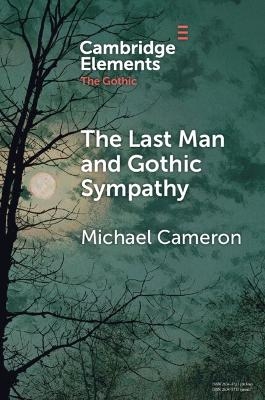
The Last Man and Gothic Sympathy
Seiten
2024
Cambridge University Press (Verlag)
978-1-009-35753-1 (ISBN)
Cambridge University Press (Verlag)
978-1-009-35753-1 (ISBN)
This Element explores the 'Gothic sympathy' as it appears in a collection of 'Last Man' novels. It does this by dramatizing complicated relationships between a lone liberal-humanist subject and other-than-human or posthuman subjects that will persist beyond humanity's extinction.
This Element explores the theme of 'Gothic sympathy' as it appears in a collection of 'Last Man' novels. A liminal site of both possibility and irreconcilability, Gothic sympathy at once challenges the anthropocentric bias of traditional notions of sympathetic concern, premising compassionate relations with other beings – animal, vegetal, etc. – beyond the standard measure of the liberal-humanist subject, and at the same time acknowledges the horror that is the ineluctable and untranslatable otherness accompanying, interrupting, and shaping such a sympathetic connection. Many examples of 'Last Man' fiction explore the dialectical impasse of Gothic sympathy by dramatizing complicated relationships between a lone liberal-humanist subject and other-than-human or posthuman subjects that will persist beyond humanity's extinction. Such confrontations as they appear in Mary Shelley's The Last Man, H.G. Wells's The Time Machine, and Richard Matheson's I Am Legend will be explored.
This Element explores the theme of 'Gothic sympathy' as it appears in a collection of 'Last Man' novels. A liminal site of both possibility and irreconcilability, Gothic sympathy at once challenges the anthropocentric bias of traditional notions of sympathetic concern, premising compassionate relations with other beings – animal, vegetal, etc. – beyond the standard measure of the liberal-humanist subject, and at the same time acknowledges the horror that is the ineluctable and untranslatable otherness accompanying, interrupting, and shaping such a sympathetic connection. Many examples of 'Last Man' fiction explore the dialectical impasse of Gothic sympathy by dramatizing complicated relationships between a lone liberal-humanist subject and other-than-human or posthuman subjects that will persist beyond humanity's extinction. Such confrontations as they appear in Mary Shelley's The Last Man, H.G. Wells's The Time Machine, and Richard Matheson's I Am Legend will be explored.
1. Gothic sympathy and the last man; 2. Shelley's infectious despair; 3. Wells's vicious sympathy; 4. Matheson's dialectic of posthuman sympathy; References.
| Erscheinungsdatum | 16.03.2024 |
|---|---|
| Reihe/Serie | Elements in the Gothic |
| Zusatzinfo | Worked examples or Exercises |
| Verlagsort | Cambridge |
| Sprache | englisch |
| Maße | 150 x 230 mm |
| Gewicht | 140 g |
| Themenwelt | Literatur ► Fantasy / Science Fiction ► Science Fiction |
| Geisteswissenschaften ► Sprach- / Literaturwissenschaft ► Anglistik / Amerikanistik | |
| Geisteswissenschaften ► Sprach- / Literaturwissenschaft ► Literaturwissenschaft | |
| ISBN-10 | 1-009-35753-0 / 1009357530 |
| ISBN-13 | 978-1-009-35753-1 / 9781009357531 |
| Zustand | Neuware |
| Haben Sie eine Frage zum Produkt? |
Mehr entdecken
aus dem Bereich
aus dem Bereich


